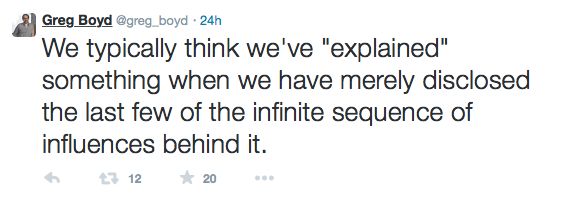We run our website the way we wished the whole internet worked: we provide high quality original content with no ads. We are funded solely by your direct support. Please consider supporting this project.
Why? The Question That Cannot Be Answered
Yesterday Greg sent out the following flurry of tweets:





To provide some background to these tweets, the following illustration will prove helpful:
They mystery of evil and an eight-second interval
Let’s assume that there is an eight-second interval between two cars. Now let’s try to explain why there is this eight-second interval at this particular time and place. To assess this we would need to acquire an exhaustive knowledge of all the factors that led these two drivers to be on that freeway at just that moment, driving at just that speed. Had anything been different that day for either driver, the interval might have been longer or shorter—or perhaps nonexistent. The interval between these two cars was also affected by the speed of all the other drivers on the freeway at that time and before. Thus we would also have to acquire an exhaustive knowledge of all the factors that influenced all the drivers on the freeway that day, driving the exact speed they were driving.
We have not yet arrived at the initial conditions explaining the eight-second interval, however, for one cannot exhaustively understand the behavior of any driver on the freeway on this particular day without understanding all the factors that influenced this behavior on the previous day, week, months and years. Had anything been different—a career choice, a marriage choice, an unplanned pregnancy, an ice storm that altered the lives of a certain driver’s parents in 1942—the eight-second interval may have been different. To understand such matters, we would have to consider all the variables that influenced everyone who ever influenced the drivers on the road that day, as well as the variables that influenced people who might have been on the road had things turned out differently. Every person, every decision, every physical and spiritual factor through history that exercised any influence on creating this eight-second interval would have to be fully understood if the interval was to be exhaustively explained.
Attaining anything like this understanding is obviously impossible for finite human beings. Thus we must conclude that we simply cannot know in any exhaustive sense why there was an eight-second interval between two given cars instead of a nine- or seven-second interval or no interval at all.
The same might be said for every contingent feature of our world. Why is a particular insect flying in a particular pattern in this particular place at this particular time? Why does a particular tornado destroy a particular house and not a different house? Why does a particular stock go up to a certain level at a particular time and down to a certain level at a different time? We can specify the kind of things that explain these facts, but we will never exhaustively explain the particular facts themselves.
The mystery of why a particular child is abducted by a particular person at a particular time is no more or less mysterious than this. Here too we can specify the kind of things that explain these kinds of events, but we cannot explain any of their particularities. It is the direct result of a person’s free will and the indirect result of innumerable other human and spiritual free wills. Beyond this, however, we can say little.
It is enough for us to know that this mystery is not about God but about creation. Among the few things we can know with certainty is that God’s character is unequivocally loving, holy and good, for he is clearly revealed in the person of Jesus Christ. Thus we can know that he revolts against this and all other forms of evil.
—Adapted from Satan and the Problem of Evil, pages 218-220
Category: General
Tags: Complexity, Mystery, Problem of Evil, Theodicy
Topics: The Problem of Evil
Related Reading

The Risk of Love & the Source of Evil
On Sunday Greg tweeted the following: Love IS a tremendous risk. But if humans ever concluded the risk was not worth it, we likely become extinct rather quickly. … Yes, love is risky. It costs us everything, and we sometimes get terribly hurt. But it’s this risk that “makes the world go round.” … And…

Did Jesus Say That God Causes Blindness?
As he went along, he saw a man blind from birth. His disciples asked him, “Rabbi, who sinned, this man or his parents, that he was born blind?” “Neither this man nor his parents sinned,” said Jesus, “but this happened so that the works of God might be displayed in him (Jn 9:1-3, NIV) Commentators typically appeal to this passage…

Paradigm Shift Questions
A couple that was recently introduced to ReKnew and several of my books recently wrote to tell me that they are in the process of embracing the warfare worldview along with the open view of the future. They said that they “realize that these things aren’t minor adjustments but are rather all-encompassing paradigm shifts in…

Speaking of Tragedies
Since we’ve been reflecting on recent tragedies and the varying responses to them, we thought we would add this voice to the mix. This article from the New Yorker points out the differences in media coverage between the Aurora shootings and the shootings at the Sikh temple in Wisconsin. From the article: Sadly, the media…

God-Talk When Disaster Strikes
Kent Annan posted 5 God Excuses to Avoid After a Natural Disaster and Conor Finnegan shared some social media God-speak that was posted in the aftermath of Sandy’s devastation. Disasters like this reveal so much about our picture of God. Let’s be careful to reflect the love of God when we speak in the midst…

Past Sermon Series: Crap Happens
Why God, why? This may be the most repeated prayer in history. Most people have said it at one point or another, if only under their breath. Why sickness? Why suffering? Why doesn’t God respond to my prayers? Why do I struggle so much? Honest questions like these deserve honest answers. During our [Crap] Happens series, we’ll explore…

